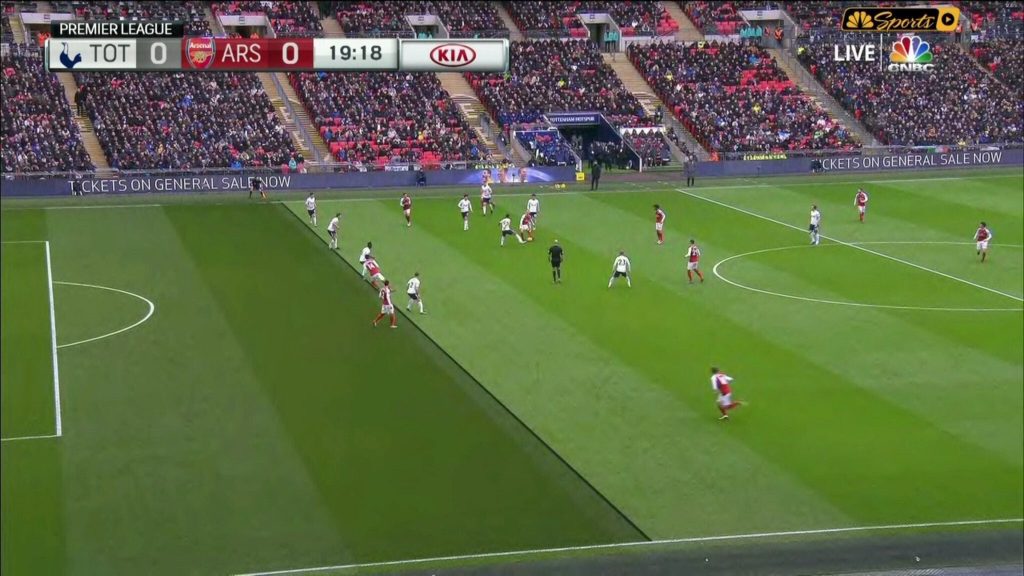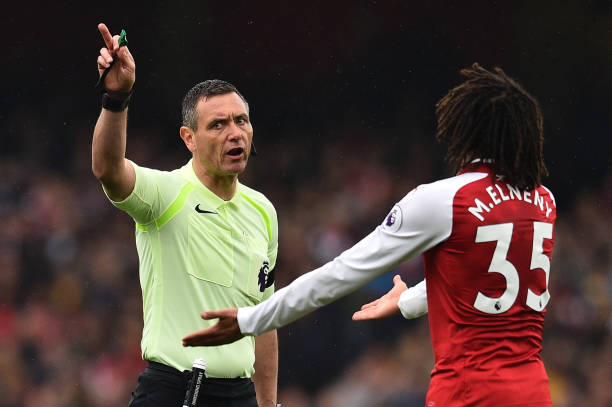The Premier League have rejected the introduction of VAR next season, instead opting for further testing in the cup competitions.
The BBC report that the Premier League clubs voted against the system. Their article referenced problems with the testing so far, saying:
“In Manchester United’s victory at Huddersfield in the last 16 of the FA Cup, for example, on-screen lines used to adjudicate on an offside decision were curved and distorted.”
This is actually not true, as the BBC themselves reported. Hawk-Eye stated that the ‘squiggly line’ shown on TV wasn’t actually used by the VAR assistant. Nonetheless, the false story prevails, and it’s apparently now part of the reason the clubs don’t want VAR.
I’d hope Arsenal are one of the clubs pushing for technology, given Arsene Wenger’s stance on it. Just in case they aren’t though, here are some of the most obvious examples from this season for why they should be:
No penalty vs Stoke City (A)
04. Penalty Not Given vs. Stoke (Ref Andre Marriner). Clear late challenge by Diouf, bringing down Bellerin. pic.twitter.com/pzuOCNptNN
— UZ (@mrarsenal93) August 20, 2017
Bellerin was caught by Diouf without the Stoke man making any contact with the ball. The score was 0-0 at the time. The referee couldn’t see from his angle whether there was any contact, but looking at a replay would’ve cleared it up very quickly. The match ended 1-0 to Stoke.
No foul vs Everton (A)
16. Foul Goal allowed (vs. Everton) (Ref Craig Pawson) Gueye fouls Xhaka and makes no contact with the ball, which was not given, resulting in a goal that shouldn’t have counted. pic.twitter.com/vWEMUweDdC
— UZ (@mrarsenal93) November 10, 2017
At first glance, Idrissa Gueye seems to win the ball, and the referee doesn’t pull it back for a foul. However, on closer inspection, he didn’t actually get a touch.
That was confirmed officially by the Premier League, when they decided not to award an assist to Gueye. Knowing there was no touch, it’s a clear foul. Luckily, Arsenal won anyway on this occasion.
Offside goal vs Manchester City (A)
18. Offside Goal Allowed vs. Man City (Ref Michael Oliver, Asst. Stuart Burt) – David was offside when he assisted the goal. pic.twitter.com/JSzuYRzCsx
— UZ (@mrarsenal93) December 10, 2017
This City side don’t need much help taking teams apart, but they got it from the assistant referee at the Etihad. David Silva was clearly offside when he set up Gabriel Jesus’ goal at a crucial point in the match. Arsenal were 2-1 down, with the momentum, but that all fell apart at 3-1.
It would’ve taken no more time to review the goal than City spent celebrating it, and who knows what could’ve happened after it was disallowed?
No penalty vs Manchester United (H)
26. Penalty Not Given (vs. Man Utd) (Ref – Andre Marriner) Darmian completely misses the ball and hits Welbeck, bringing him down inside the penalty area. pic.twitter.com/geGGYUwRST
— UZ (@mrarsenal93) December 12, 2017
Once again, this wasn’t necessarily an easy call to make in real time from the referee’s position. He can’t tell if there really was any contact on Welbeck. However, you only need to see one replay for it to be completely clear that it’s a penalty.
There’s no contact on the ball, the Arsenal striker has his legs taken out, it’s an easy call for a VAR assistant. United won the match 3-1.
Penalty vs West Bromwich Albion (A)
33. Wrong Handball Penalty Given (vs. West Brom)(Ref- Mike Dean)
Arms not moved deliberately towards the ball. Small distance between Gibbs and Chambers. Arms in close to the body (natural defensive stance in penalty area) And Dean ‘implies’ a raised/stretched arm for the pen pic.twitter.com/daPnnEL2fA— UZ (@mrarsenal93) January 2, 2018
The ball hits Calum Chambers’ arm as Kieran Gibbs attempts to put a cross in, but there’s no way the Arsenal defender has enough time to react. His arms are in a natural position, and Gibbs even shields the ball out for a corner.
Mike Dean makes a snap decision (which he later admitted he got wrong) but the replays show it was ball-to-hand. The decision gifted West Brom a point, coming in the final minutes with Arsenal 1-0 up at the time.
Offside vs Tottenham Hotspur (A)

This was a massive decision early in a season-defining game for Arsenal, and the assistant unfortunately got it wrong. It’s not an easy call in real time, especially given the pace Pierre-Emerick Aubameyang moves at. However, if you look closely at the above picture, you can see he’s onside.
It may look as though his shoulder is slightly over the line, but Jan Vertonghen’s foot is also over the line, so that’s just a mistake on the part of the graphics team with BT.
The match ended 1-0 to Tottenham, but it could have been so different if Arsenal had taken the lead.
The current version of VAR wouldn’t review this decision anyway, but it’s an example of where there’s still potential for technology to help. Until the Premier League makes the first step, they’ll never change how they deal with incidents like this one.
Red card vs Southampton (H)
Fortunately, this decision didn’t lead to anything. Arsenal still won the match, and the FA decided to overturn the dismissal, so Elneny won’t have to serve a suspension. The fact that the FA admit it was the wrong call is why I’m including it here though.
It was clear to everyone watching that Elneny had done no more than almost everyone else on the pitch, by pushing one Southampton player once (and then getting pushed back even harder by Ryan Bertrand). The referee obviously thought he saw something more, but the replays show that was the extent of the incident.
Decisions like that could easily lead to an equalising goal on another day. In the time it takes for Elneny to argue with the referee and walk off the pitch, someone could look at the incident and see it was a mistake.
